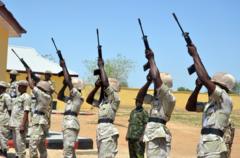Despite battling jihadist groups for over a decade, Nigeria's military continues to face significant challenges, highlighted by the recent killing of 35 jihadists in air strikes near its border with Cameroon. The attacks, spread across four locations, were aimed at preventing imminent assaults on ground troops.
Prominent Nigerian figures, including former government officials and civil society leaders, voiced their concerns about escalating violence, equating the situation to a "war-time level of slaughter" despite the country being officially at peace. According to a report from Amnesty International, over 10,200 lives have been lost since President Bola Tinubu assumed office two years ago.
They are pushing for the establishment of a Presidential Task Force, which would have extensive powers to address ongoing conflicts, including Boko Haram and the Islamic State West Africa Province (Iswap). Recent military reports claim nearly 600 militants have been eliminated in the past eight months, though independent verification remains absent.
The Nigerian Air Force intends to uphold its support for ground troops combating jihadist strongholds in the north-east. The ongoing conflict has resulted in the deaths of more than 35,000 individuals and the displacement of two million, as per UN data. The conflict's intensity has surged this year, with at least 15 jihadist attacks noted in regions close to Nigeria’s borders with Cameroon and Niger. Notably, jihadists have adopted modified commercial drones to target military bases, complicating troop reinforcements.
Earlier this month, the US granted approval for a $346 million arms sale to Nigeria, underlining international involvement in addressing the nation's security challenges. For more insight and updates on this developing story, check out BBC’s dedicated coverage on Nigeria.
Prominent Nigerian figures, including former government officials and civil society leaders, voiced their concerns about escalating violence, equating the situation to a "war-time level of slaughter" despite the country being officially at peace. According to a report from Amnesty International, over 10,200 lives have been lost since President Bola Tinubu assumed office two years ago.
They are pushing for the establishment of a Presidential Task Force, which would have extensive powers to address ongoing conflicts, including Boko Haram and the Islamic State West Africa Province (Iswap). Recent military reports claim nearly 600 militants have been eliminated in the past eight months, though independent verification remains absent.
The Nigerian Air Force intends to uphold its support for ground troops combating jihadist strongholds in the north-east. The ongoing conflict has resulted in the deaths of more than 35,000 individuals and the displacement of two million, as per UN data. The conflict's intensity has surged this year, with at least 15 jihadist attacks noted in regions close to Nigeria’s borders with Cameroon and Niger. Notably, jihadists have adopted modified commercial drones to target military bases, complicating troop reinforcements.
Earlier this month, the US granted approval for a $346 million arms sale to Nigeria, underlining international involvement in addressing the nation's security challenges. For more insight and updates on this developing story, check out BBC’s dedicated coverage on Nigeria.





















